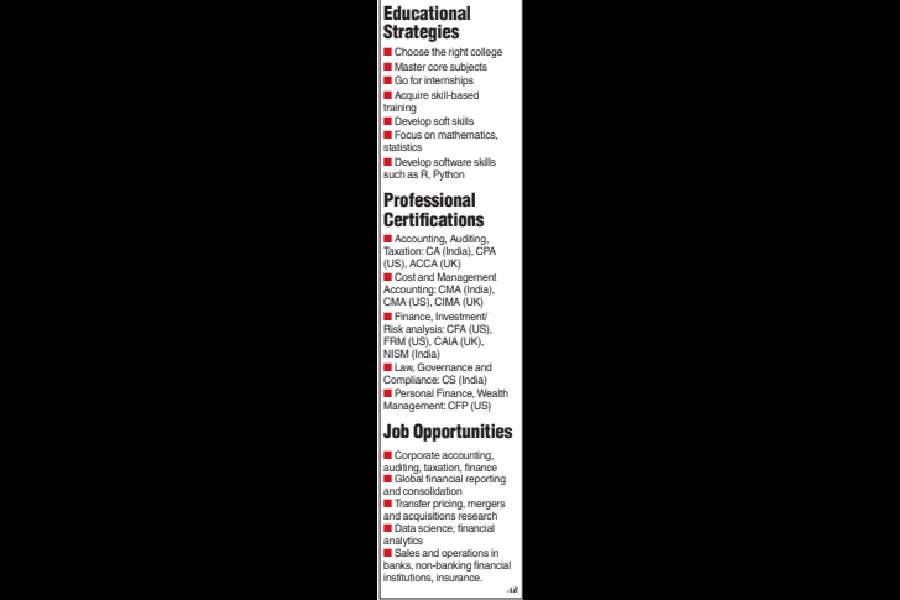Commerce cocktail


Aniruddha Ghosh, a commerce graduate from rural Burdwan, was not sure what to do for a livelihood after completing his bachelor’s. His grades were not brilliant, nor did he have the means to join a private institution to pursue a master’s in business administration or a postgraduate diploma in management as some of his peers did.
After discussions with some senior students and teachers, he decided to join a private bank in an “off-roll position”, meaning he would work at the bank but as a representative of a private staffing agency. The salary was modest though he had to work long hours. But the exposure and learning was immense.
Fast forward two years. With his experience and learnings, Ghosh took up the position of financial manager operations at a well-known insurance company. As luck would have it, here, he met one of his college mates who had opted for an MBA from a low-tier institute and was now working with the insurance company in an “off-roll position”. This friend couldn’t handle the pressure and quit within six months.

Globalisation and global back-office operations in India have played a transformative role in shaping the careers of commerce students across the country. And courses such as ACCA (UK), CPA (US), CFA (US), CIMA (UK) and CMA (US) unlock the job mine that is international accounting.
Karthigai Prakasam, who is associate dean of the School of Commerce, Finance and Accountancy, Christ University, Bangalore, talks about how “students are completing international certifications before they complete BCom and have a clear upper hand in lucrative job opportunities”. These international certifying bodies often partner with reputed colleges or universities and reduce certification requirements by granting exemptions for certain subjects.
In recent times, India has become a hub of global capacity centres (GCCs) — a strategic unit established by multinational corporations — to perform various functions on a global scale, leveraging a local skillforce familiar with the latest technological tools at lower operating costs. These MNCs offer various new job openings in global financial reporting and consolidation, taxation and transfer pricing, risk management and audit, mergers and acquisitions research for companies and process automation in finance. While the reputation of the college plays a role in landing such a job, having a global certification alongside a bachelor’s in commerce can give students a head start.
Arunava Maitra, who is vice-president (human resources and administration) of Haldia Petrochemicals says, “A BCom degree from a premium college may open doors to the corporate world, but to rise through the ranks, professional qualifications like CA, CMA will always help.” Maitra adds that a good student never stops with just a bachelor’s and follows a lifelong path of upskilling.
So, what should students look for while choosing a college? Shivangi Upadhyay, who is currently working as an accounts executive at a UK-based accountancy and consulting firm, emphasises the critical role of faculty and a well-structured curriculum in shaping a successful BCom programme. Her batchmate from college, Alina S. Joe, is now an analyst at one of the “big four” consulting firms. Alina adds that the brand reputation of a college and academic rigour significantly enhance a graduate’s employability.
With the implementation of the National Education Policy (NEP) 2020 by the Government of India, commerce education in India is poised to become more future-ready through the integration of internships, skill-based training, and multidisciplinary learning. Mathematics, statistics and economics are indispensable for a student of commerce alongside traditional disciplines of accounting and finance. A strong base in mathematics may help students venture into emerging fields such as data science, machine learning and financial technology. It is advisable for aspiring commerce graduates toopt for mathematics at Plus Two levels.
As India charts a high-growth path in both manufacturing and services, a new generation of commerce graduates is stepping up to play a pivotal role.